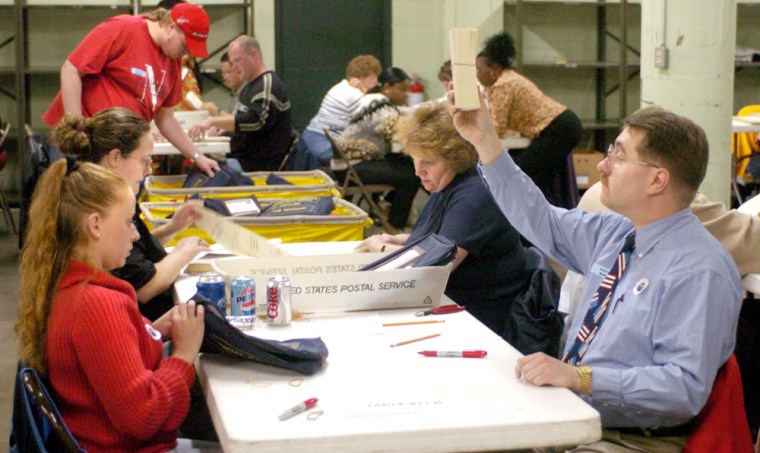Lawyers from John Kerry’s presidential campaign are scrutinizing the results of voting in Ohio, but the campaign said the effort is not aimed at changing the outcome of the election.
"While the outcome of the election is not in doubt, no one cares more about voting irregularities than John Kerry and John Edwards,” Kerry campaign spokesman David Wade said in describing what he called a “fact-finding mission” in Ohio. “They remain committed to their pledge that every vote be counted, that's why they built an unprecedented 17,000 lawyer voter protection team to ensure that every American's rights are protected."
Officials in Ohio’s 88 counties are still checking 155,337 provisional ballots to ensure they are valid, and then counting them in a process that is expected to take another week or more. The hotly contested state’s 20 electoral votes gave President Bush the cushion he needed to win re-election.
Bush leads by 136,000 votes
With Bush leading the Democratic presidential nominee Kerry by more than 136,000 votes in the pivotal state in unofficial returns, it would be practically impossible for provisional ballots to change the outcome.
But Kerry’s lawyers say they want to identify any voting problems and put to rest any doubts about the legitimacy of the Ohio vote. To do that they’ll ask election officials about the number of absentee and provisional ballots and if there were any reports of equipment malfunctions.
For the first time this year all states were required to use provisional ballots when voters said they were properly registered but their names weren’t on the rolls.
Judging from past elections, most provisional ballots will be valid, and the total will more or less reflect the overall vote.
Elections employees are using the names on envelopes containing the provisional ballots to determine whether people meet registration requirements, and whether they voted in the correct precinct.
Valid ballots are eventually added to each county’s vote count report, which must be approved by Democrat and Republican board members. Any disputed provisional ballots will be voted on by the members. Republican Secretary of State J. Kenneth Blackwell will break any ties.
‘A time-consuming process’
“This is a time-consuming process, just making sure that every ballot is accounted for,” said Michael Vu, director of the bustling Cuyahoga County elections board in Cleveland.
The state gives boards until Dec. 1 to count and certify every vote. The state has set up a toll-free number for voters to find out if their ballot was counted and if not, why.
Most counties contacted Wednesday by the Associated Press said they were not keeping running totals of how many provisional ballots were valid, but a few that had done partial tallies said most votes appeared to be legitimate.
In 2000, about 107,000 of the 123,518 provisional ballots were deemed valid, or about 87 percent. If that percentage holds for the 2004 election, Kerry wouldn’t win even if every single provisional ballot were somehow cast for him.
Spokesman Dan Trevas said the Ohio Democratic Party will monitor the process but so far hasn’t heard of any major problems. He would not say if he believes the provisional vote count could change the election’s outcome.
“We expect everybody to see the entire process as it goes on,” he said.
GOP wants to put ‘wild ideas to rest’
Jason Mauk, an Ohio GOP spokesman, said both sides want all legitimate votes to count. As for theories about how Kerry could pull out a win, Mauk said, people need to “let the process work so we can put those wild ideas to rest.”
Despite the stakes, Ohio elections workers aren’t under the microscope the way Florida’s were after the contested 2000 presidential election.
Still, voters “want to know if their vote counted. If not, they want to know why, and we’re giving them that this election,” said Debbie Ford, a Franklin County voter services supervisor.
